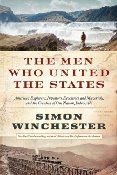
The Men Who United The States by Simon Winchester
 The Men Who United The States is Simon Winchester’s latest book. Having just finished The Professor and The Madman (reviewed here), this reviewer was eager to read his next book when it arrived from the publicist.
The Men Who United The States is Simon Winchester’s latest book. Having just finished The Professor and The Madman (reviewed here), this reviewer was eager to read his next book when it arrived from the publicist.
Winchester’s latest book is organized around what could have easily been a contrived theme. Apparently the author recognized the danger he was in and so backed off, making it a rough organizing principle, rather than forcing the issue. Winchester’s wife is Japanese, presumably enamoring him at least to some extent with eastern culture. Perhaps that is the source of the book’s strange organizational framework – the five classical elements
- Wood
- Earth
- Water
- Fire
- Metal
Although Winchester doggedly returned to the theme at the onset of each of the corresponding sections of the book, he pretty much ignored it after the first section. The reader can easily forget that organizing structure as the book also follows a roughly chronological one.
Winchester takes the reader on trip through American history that starts with the Lewis and Clark expedition and ends with the present day. His earlier sections are more thorough and in-depth. Perhaps this is fitting as technological innovation and the growth of the United States pick up speed as the book progresses from Thomas Jefferson’s time.
In addition to Lewis and Clark, Winchester writes interesting limns of other explorers, such as John Wesley Powell, geologists like Clarence King, socialist dreamers like Robert Owen and his son, civil engineers Loammi Baldwin Jr. and Sr., as well as many other accomplished individuals.
Given the length of the book 450+ pages, it’s not surprising that Winchester had to skip over many interesting details which he undoubtedly uncovered in the course of his research. He succeeds in piquing the curiosity of the reader in many cases. (For instance, this reader would like to go find Paradise, some day.) The short anecdotal sketches brought many previously unknown historical characters to this reader’s attention.
The author sprinkles in personal experiences with some of the places mentioned in the book that juxtapose the present with the past. Again, this serves to stimulate interest and encourages the reader to seek out some of these places.
Unfortunately, Winchester injects his political views in the latter half of the book, at first with some subtlety and then without pretense. Admittedly, that might have been more tolerable were these views in accord with the reviewer’s!
Winchester is obviously enamored with Franklin Delano Roosevelt, whose policies, particularly public works projects, he extols rapturously. His depiction of Roosevelt and his policies was very one-sided. The Egyptians had public works projects, too.
At another point in the book, he invokes his disdain for hunters, recounting a story in which he met up with a man and his son out hunting, sneering, to the effect “It’s a nice day, let’s go out and kill something.â€Â He does grudgingly admit, however, that on talking to the father in son, he discovered that they were very nice people.
Winchester is also a huge fan of National Public Radio, and unfolds the story of its founding father. Bill Siemering. This might have been more interesting had Winchester simply told the story, rather than insisting on indulging in nauseating panegyrics about the unifying wonders of state-sponsored media. He even laments the success of what he views as lower forms of the media.
Meanwhile the commercial airwaves today echo to the sound of hectoring and demagoguery. There are national conversations in process, true. The most popular of all, a conservative rabble-rouser broadcasting in Florida, preaches to as many as twenty million listeners a day and earns $50 million a year for doing so. But his is far from being a unifying conversation: it is broadly seen as divisive and unkindly, sharply separating radio audiences into radically opposed camps.
NPR couldn’t have said that better. With approximately half of America in that opposing camp, it seems that Winchester would rather we all just comply with the socialist agenda he seems to find so admirable in his hopes for planetary unanimity.
It is surely self-evident that the Internet, the great new technological missionary of the age, is obliged to a future lying well beyond America. Its creators have as their unstated vision the uniting of the whole world. The unum that is America’s proudest accomplishment today will in time become part of an even greater pluribus, which one day will be similarly forged by electronics into one great planetary unity.
These comments and innuendos detracted immensely from what was, on the whole an interesting and well-written book. However, instead of finishing the book with a positive impression, this reviewer was left with a sour taste in his mouth.
 The posts are coming!
The posts are coming!


0 comments
Kick things off by filling out the form below.
Leave a Comment